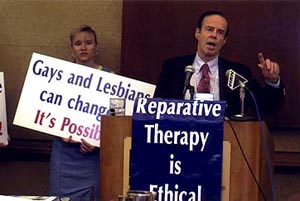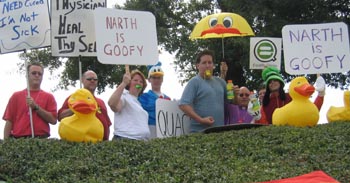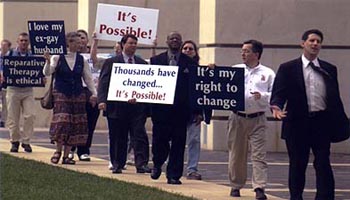 |
Homosexuality and the Clergy
2009 Scientific Report Confirms
125 Years of Observation on Homosexuality
| National Association for Research and Therapy of Homosexuality |
There is an important point of contention between the American Psychological Association's (APA) and the National Association for Research and Therapy of Homosexuality (NARTH). The former defends the right of homosexuals to be so and oppose any attempt to change this behavior. NARTH attacks this position, upholding that homosexuals must and can change their behavior, and demonstrates successful reorientation practices.
To support its point in this ongoing polemic, in 2009 NARTH released a refutation to APA titled What Research Shows: NARTH's Response to the APA Claims on Homosexuality. The study offers recent data that confirms 125 years of research on homosexuality. We reproduce verbatim Part III and the Conclusion of the NARTH study in which scientific conclusions on homosexuality appear. The full text may be read here. TIA
There is significantly greater medical, psychological, and relational pathology in the homosexual population than the general population.

Psychiatrist Dr. Robert Spitzer defends the possibility of sexual reorientation outside an APA meeting |
Researchers have shown that medical, psychological and relationship pathology within the homosexual community is more prevalent than within the general population. This is supported by studies that demonstrate the life-threatening risk-taking of unprotected sex, violence, antisocial behavior, higher levels of substance abuse, anxiety disorders, depression, general suicidality, higher levels of promiscuity and of non-monogamous primary relationships, higher levels of paraphilias (such as fisting), sexual addiction, personality disorders, and greater overall pathology among homosexual vs. heterosexual populations. In some cases, homosexual men are at greater risk than homosexual women and heterosexual men, while in other cases homosexual women are more at risk than homosexual men and heterosexual women.
Overall, many of these problematic behaviors and psychological dysfunctions are experienced among homosexuals at about three times the prevalence found in the general population - and sometimes much more. Investigators using modern, state of the art research methods have documented that many different pathological traits are more prevalent in homosexual than in heterosexual groups. We believe that no other group of comparable size in society experiences such intense and widespread pathology.
An objective synthesis of the clinical and research literature derived from hundreds of sources reveals numerous scientific findings:
- Despite knowing the AIDS risk, homosexuals repeatedly and pathologically continue to indulge in unsafe sex practices.
- Homosexuals represent the highest number of STD cases.
- Many homosexual sex practices are medically dangerous, with or without protection.
- More than one-third of homosexual men and women are substance abusers.
- Forty percent of homosexual adolescents report suicidal histories.
- Homosexuals are more likely than heterosexuals to have mental health concerns, such as eating disorders, personality disorders, paranoia, depression, and anxiety.
- Homosexual relationships are more violent than heterosexual relationships.
- Societal bias and discrimination do not, in and of themselves, contribute to the majority of increased health risks for homosexuals.
The usual hypothesis is that societal discrimination against homosexuals is solely or primarily responsible for the development of this pathology. However, specific attempts to confirm this societal discrimination hypothesis have been unsuccessful, and the alternative possibility – that these conditions may somehow be related to the psychological structure of a homosexual orientation or consequences of a homosexual lifestyle – has not been disconfirmed.

Above, homosexuals protest NARTH's position in Orlando; below, advocates march in its defense
 |
Indeed, several cross-cultural studies suggest that this higher rate of psychological disturbance is in fact independent of a culture's tolerance of – or hostility toward – homosexual behavior. We believe that further research that is uncompromised by politically-motivated bias should be carried out to evaluate this issue.
A client's desire to prevent or cease experiencing such a variety of serious medical, psychological, and relational health risks is sufficient reason for anyone to seek and receive competent psychological care to minimize or resolve the desires, behaviors and lifestyles associated with such increased risks. The concerns of parents, family members and friends of persons whose sexual behaviors and/or attractions leave him or her at risk for such harms are understandable and scientifically justified. Mental health professionals ethically may offer psycho-educational and therapeutic assistance to families with such concerns in a manner that respects their loved one's age-appropriate needs for autonomy, self-determination, and confidentiality and that otherwise preserves the integrity of the therapeutic relationship.
Conclusion
In What Research Shows, over a century of experiential evidence, clinical reports, and research evidence demonstrate that it is possible for both men and women to change from homosexuality to heterosexuality; that efforts to change are not generally harmful; and that homosexual men and women do indeed have greater risk factors for medical, psychological and relational pathology than do the general population. Based on our review of 125 years of reports by clinicians, researchers, and former clients, we conclude that reorientation treatment has been shown to be beneficial — and not harmful — and therefore should continue to be available to those who seek it.

Homosexual in the final stage of AIDS - A risk that should be prevented by virtue and reorientation |
The APA's own Code of Ethics supports every client's rights to autonomy and self-determination in therapy and mandates that therapists either respect a client's practice of religion and sexual orientation or refer the client to a professional who will offer such respect. Clients who are not distressed about their sexual orientation should not be directed to change by mental health professionals. Conversely, clients who seek sexual reorientation deserve properly informed and competent psychological care from therapists who use interventions that have been scientifically demonstrated as helpful for achieving this goal.
1. This is a summary of the peer-reviewed monograph: National Association for Research and Therapy of Homosexuality (NARTH) Scientific Advisory Committee (2009). What Research Shows: NARTH's Response to the American Psychological Association's (APA) Claims on Homosexuality. Journal of Human Sexuality, 1, 1-128. Requests for copies of this journal should be addressed to NARTH, 307 West 200 South - Suite 3001, Salt Lake City, UT 84101, or can be ordered by phone at 1-888-364-4744 or online at www.narth.com.
2. The terms homosexuality and homosexual are used throughout this report as per their historical and scientific usage. The authors are aware that the terms lesbian and gay are self-identifying labels chosen by some homosexuals.

Posted October 13, 2010

Related Topics of Interest
 Studies Confirm Homosexuality’s Dangers - Data up to 2010 Studies Confirm Homosexuality’s Dangers - Data up to 2010
 Homo Statistics from 2006 to 2009 Homo Statistics from 2006 to 2009
 Stats on Homosexuality from 2002 to 2005 Stats on Homosexuality from 2002 to 2005
 Everyone Should Know these Statistics - 1978 to 1994 Everyone Should Know these Statistics - 1978 to 1994
 Homosexuals Cause Nausea to Our Lord Homosexuals Cause Nausea to Our Lord

Related Works of Interest
|
|
Homosexuality | Hot Topics | Home | Books | CDs | Search | Contact Us | Donate

© 2002-
Tradition in Action, Inc. All Rights Reserved
|
 |
|